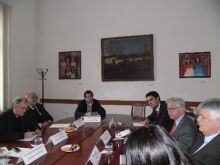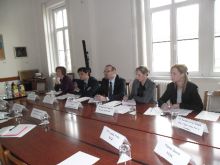The National Economic and Social Council of Hungary
1. Visit of Mr van Iersel to the Hungarian Economic and Social Council

On February 15th Mr van Iersel paid a visit to the Hungarian Economic and Social Council (ESC) in his capacity as chairman of the Steering committee. He was kindly received by Dr. Latorcai Csaba, Undersecretary of the Ministry of Human Resources, responsible for relations with the churches, minorities and social partners, and President of the ESC. Europe 2020 is an important theme. Engagement of the organisations is needed in order to commit all layers of society in the process of modernisation. To that end innovative ideas that can be brought forward by all participants, are being discussed while the social partners are consulted systematically on new bills, resulting in an ongoing social dialogue between the social partners and the various ministries, depending on the issues. The NRP is a very welcome opportunity to assess various processes in which all parties are taking part.

This meeting was followed by a separate discussion with representatives of the social partners, including NGOs and the churches. Although the current process that started in 2011, is a satisfactory starting point, there is criticism as to the way it works in practice. There is often too little time for elaborate consultations while restructuring of the institutional framework tends to exclude some of the traditional partners from the negotiations. On the other hand, the process has gained efficiency as opposed to the previous situation. A special point in case is the current inclusion of NGOs in the discussions. It is an important group as it embraces hundreds of thousands volunteers in over 6000 organisations. Undoubtedly, the forum of discussions between the government and the non-governmental organisations generates positive results. However, despite the government is obliged to make an annual report on the proceedings, the set-up is not very firmly based which entails uncertainty and possible gaps. Finally, it is worth noting that there is no direct contact between the Commission and civil society in the EU fact-finding process. In both discussions Mr van Iersel explained the supportive role the EESC can and wants to play in favour of strengthening the links between national cvil society organisations and the EU.
2. Legal basis of establishment
The Government of Hungary adopted The Declaration of National Cooperation in 2010 as part of The Program of National Cooperation in order to acknowledge the inception of a new social contract. In order to enforce the new social contract the Government of Hungary established the System of National Cooperation which is open to all Hungarians.
The Government of Hungary offers cooperation to every member of society, to NGOs and advocacy organizations, and to economic players to find solutions to issues of national interest.
The Parliament adopted the ACT XCIII of 2011 on the National Economic and Social Council in recognition of the role of economic and social dialogue, in order to discuss strategies of national economy and social policy and to promote a consensus among various interest groups of society.
On 11 October 2011, the National Economic and Social Council of Hungary's (abbreviated NESC in English, and NGTT in Hungarian) inaugural session was held in the House of Parliament, attended by Prime Minister Viktor Orbán and a number of government representatives.
3. Membership
The NESC is a consultative, proposal-making and advisory body independent from Parliament and the Government. The NESC has 32 members, representing the Hungarian civil society, creating the following sides:
1. Side of Representatives of Economy: advocacy groups and organizations of employers, national business chambers
2. Side of Employees: advocacy groups and organizations of employees
3. Side of NGOs: NGOs active in the field of national policy
4. Side of Representatives of Sciences: Hungarian representatives of academia
5. Side of Churches
The rotating President of the Council is elected from the representatives of the sides. The rotating Presidency is based on the rotation of the sides. The sides providing the rotating President take turns every three months. The side holding the rotating Presidency nominates a rotating President from among its own members.
The mandate of NESC members is valid for four years.
The Ministers or executive officers appointed by them shall attend the Council's plenary sessions as permanent guests with a consultative right.
The President or Vice President of the Hungarian Competition Authority and the Central Statistical Office shall attend the Council's plenary sessions as guests with a consultative right.
4. Secretariat
The Government ensures the operating conditions of the Council with its work assisted by a Secretariat.
5. Functions
The NESC, the widest-ranging forum of representatives of Hungarian society holds consultations, delivers opinions, makes proposals, discusses national strategies and comprehensive matters affecting the development of the economy and society.
6. Relations with international organizations
The NESC is a full member of International Association of Economic and Social Councils and Similar Institutions.
A Permanent consultative membership is granted in the Council to a Hungarian delegate of each group of the European Economic and Social Committee.
7. Topics discussed through the initiation of NESC members over the first nine month include:
1. Consultation on determining the required national minimum wage rates
2. Consultation on consolidation and restructuring of the healthcare sector
3. Report on the Hungarian National Development Plan
4. Report on situation of adult education
5. Consultation on social and economic impact of flat-rate taxation
6. Report on sustainable development from the perspective of the Rio +20 Earth Summit
7. Report on higher education
8. Consultation on the reform of the Hungarian pension system
9. Report on the planning principles of Hungary's 2013 budget and their social and economic impact
10. Report on the situation of the construction industry
Contact information
Báthory utca 10
1054 Budapest
Hungary
Phone: 061-795-1249
E-mail: ngtt@emmi.gov.hu
